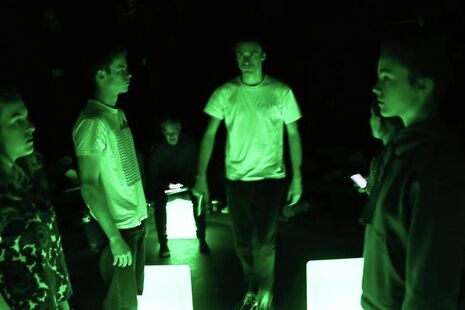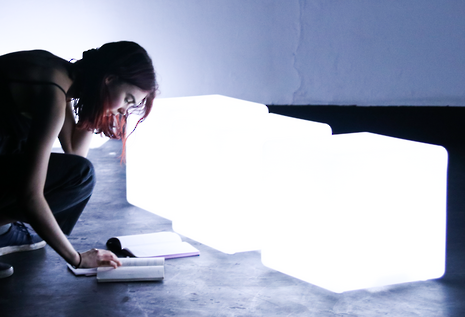Pomona preview: ‘perch on the edge of your seat’
Alistair McDowells’ disturbing vision of nightmarish flickering between reality and fantasy comes to the Corpus Playroom

“Oh, this scene is a massive plot spoiler by the way,” I am told as I walk into the rehearsal room. As a result, I am under strict instructions not to reveal any of the narrative details I saw, and to be frank, I would not want to. Not because I did not enjoy it, but rather because I fear ruining the driving pull of Pomona. Watching even this decontextualized snippet of action was enough to draw me in to the terrifying world of Alistair McDowells’ play, brought to Corpus this term by Director Jessica Murdoch. My reaction to the play was far from unique; as Murdoch points out, reviews of the original 2014 Manchester production could hardly have been more complimentary of the engaging, “compelling” (The Independent) plot of this dystopian horror story-esque play.
Although plot may not be the best word to use here. The title Pomona refers to a mythic concrete island in the heart of Manchester, where the play was originally performed. The action starts with Ollie (Rachel Kitts) in search of her lost twin. From here, the non-chronological structure and nightmarish flickering between reality and RPG-game world takes us into a dark underworld of prostitution, bordellos and family bonds, designed to leave the audience unsure of the boundaries of reality.
With such a complex structure, Murdoch explains how she put a concerted effort into characterisation during rehearsals, thoroughly laying the ground work for the play. It was important to get to grips with the internal conflicts of the characters, understanding their complexities, she says, before the actors are suddenly asked to perform emotional gymnastics. The play demands characters change mind-sets, stakes and objectives rapidly with the temporal shifts. Cast member Comrie Saville-Ferguson points out it was this spectrum of emotions that makes him love his character; balancing both the “lovable puppy-dog” nature of his character while doing some “truly obscene things”.
Working up the adrenaline to pull this off is a challenge for the cast, but one that they are rising to. As I watch, Harry Redding flips from panicked urgency to deadpan robotic movements in the blink of a lighting change, as Rachel Kitts navigates the world created for her by the rest of the cast and the set. Even Murdoch agrees that “God, it’s confusing”, but argues that part of the joy of theatre in Cambridge is the depth of talent that allows such difficult plays to be tackled, showcasing the writing and pushing actors to maximise their abilities. This shines through in the rehearsal room. From the warm up onwards, the cast is nothing but professional; scripts covered in scrawls of notes, each member concentrating on their collective responsibility for the success of the scene. Star jumps and an EDM take on ‘heads shoulders knees and toes’ set the tone of the rehearsal.

It is not merely the actors, but the whole production team that is challenged by this show. The set and props are deliberately kept to a minimum. Instead, different settings are implied through the placement and use of LED cubes, contributing to the ambiguity regarding what is ‘real’ and what is not, giving the production scope to create visually stunning sequences and transitions. In this rehearsal, electronic music underscores the movement sequence being plotted in front of me, and this, combined with the eerie glow from the (temporarily) green cubes, conjures the mood of the scene. The use of newly sampled and written music brings the piece bang up to date, feeling as fresh as the script. The amount of thought that has gone into this production is clear. Murdoch has everything notated; intense rehearsal character notes, each cube position, sound effects, lighting changes. The production value is obviously high.
In a term of theatre with a wildly varying programming, from naturalistic kitchen sink dramas to new, devised narratives, Pomona finds its niche in both the script and staging. Moving away from naturalistic drama provides a new dimension through which to look at the world and to challenge our own perceptions of our surroundings. This constant wavering between reality and fantasy is what makes this piece exciting to Murdoch, drawing the audience in through different styles of narrative. She also comments on the decisions made about staging that sets the piece apart: most characters remain on stage throughout the entire production, and it is purposefully unclear whether the peripheral characters are aware of the scenes happening in front of them and choosing not to get ‘involved’. Murdoch’s final comment is that, “whereas with most plays the audience is encouraged to ‘sit back, relax and enjoy the show’, with Pomona, you have to ‘stay perched on the edge of your seat, and keep searching’… but still, definitely, enjoy the show”. Here’s hoping we do, and I truly think we will.
Pomona is on at the Corpus Playroom 13-17 February
 News / SU reluctantly registers controversial women’s soc18 December 2025
News / SU reluctantly registers controversial women’s soc18 December 2025 Features / Should I stay or should I go? Cambridge students and alumni reflect on how their memories stay with them15 December 2025
Features / Should I stay or should I go? Cambridge students and alumni reflect on how their memories stay with them15 December 2025 News / Dons warn PM about Vet School closure16 December 2025
News / Dons warn PM about Vet School closure16 December 2025 News / Cambridge study finds students learn better with notes than AI13 December 2025
News / Cambridge study finds students learn better with notes than AI13 December 2025 News / Uni registers controversial new women’s society28 November 2025
News / Uni registers controversial new women’s society28 November 2025








